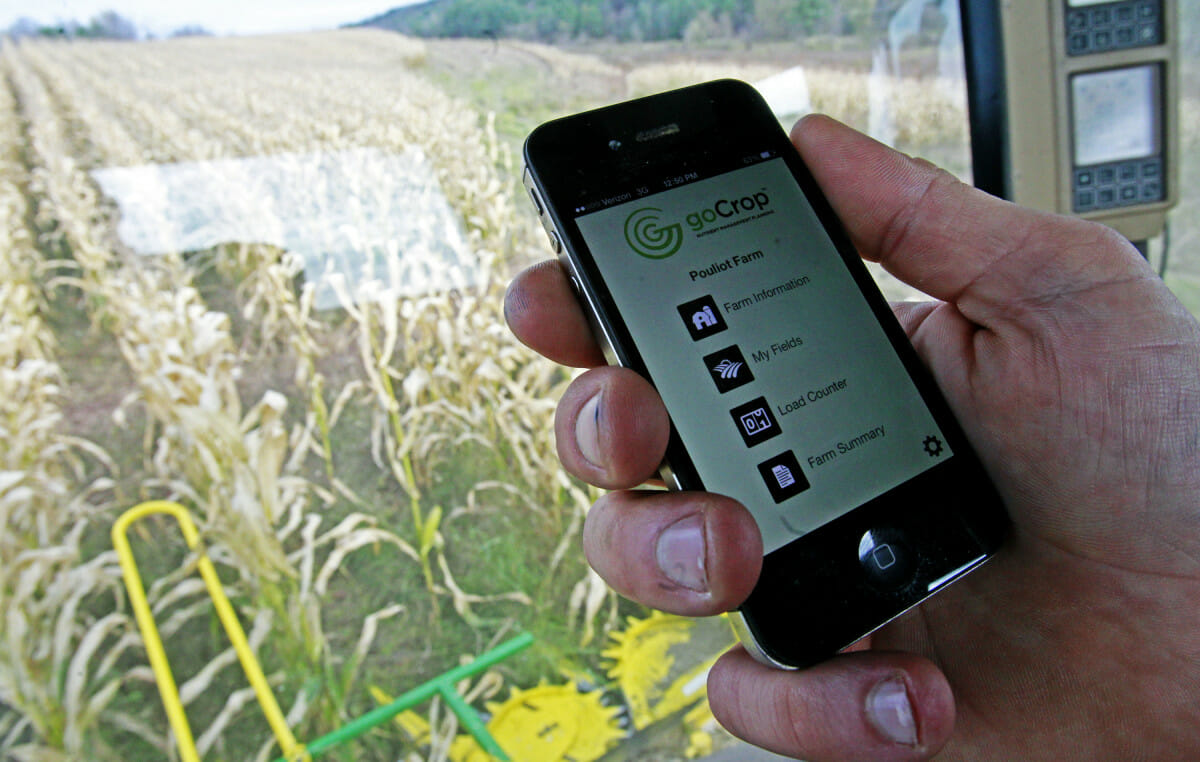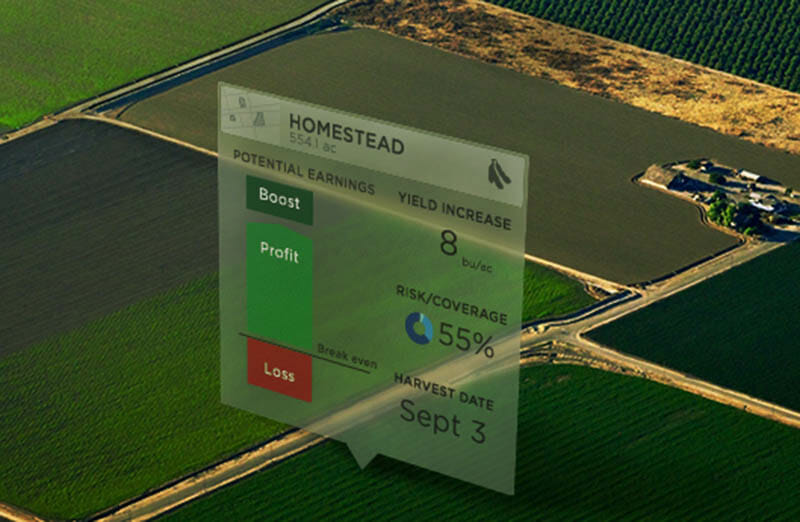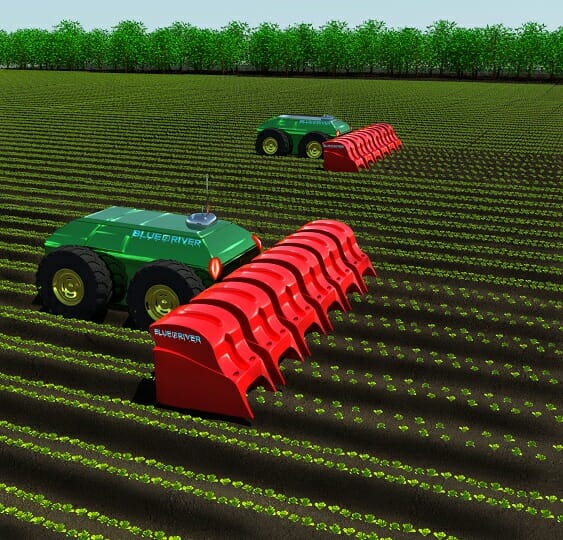8 Hot Farm Tech Start-Ups
As Silicon Valley turns its eyes towards ag, eight companies that are using tech in interesting ways in the field.
8 Hot Farm Tech Start-Ups
As Silicon Valley turns its eyes towards ag, eight companies that are using tech in interesting ways in the field.

<br>

The Climate Corporation got its start in 2006 under David Friedberg and Siraj Khaliq with the idea of selling crop insurance based on super-specific weather data. Seven years later, they found out Monsanto loved the idea somewhere to the tune of $1.1 billion. The Missouri-based ag-giant acquired the company last last November.
The Climate Corporation still works independently in San Francisco, filtering through 50 terabytes of live soil and weather data at any given time. In a letter to his company, David Friedberg defended the sale to Monsanto, writing: “The people of the Climate Corporation are going to lead the world to revolutionary solutions to historic problems. This partnership enables us with capital, data, and reach we would not have had on our own.”
“Solum” is the word geologists use to describe the earth’s layer of topsoil, so it was a natural name choice for the trio of Stanford graduates who started Solum in 2009. The company operated on two levels: offering advanced soil testing to farmers and a software platform built to aid in soil management decisions.
But just last week, Solum announced that The Climate Corporation (and parent company Monsanto) had bought the soil testing division of the company, leaving the software portion to spin off as Granular, Inc.
Again, it’s a lesson for ag start-ups. Like with electronics and smart phones, a big idea can mean big money down the line.
Many of the agriculture ideas coming out of Silicon Valley aim to make food production data more accessible, rather than investing in actual farms. Soil IQ builds on that trend, bringing the long-ordained “internet of things” to the backyard garden.
Their first product, already in production, is a 3-inch soil sensor topped with a solar panel that streams data via a cellular network and Wi-Fi. Stuck among the tomatoes and peppers, it feeds gardeners live information on soil conditions and makes recommendations on when to plant and when to harvest. For an annual subscription fee, the company even plans to send you seeds when the time is right.
Other companies like Easy Bloom and Flower Power have floated the idea of home soil sensors, but Soil IQ might have the most going for it. Jason Araburur and Luke Iseman, the partners behind the project, have conscripted Yves Behar’s Fuseproject for the same magical touch bestowed on products like the Jawbone speakers. They also have the CTO of Home Depot advising the project.
SmartGardener might not have sophisticated sensors to showcase, but it is quickly becoming a one-stop shop for backyard gardeners.
In a sense, it’s FarmVille come to life. The online platform lets you drag and drop garden beds, then helps determine which plants will work at your location. You can buy the seeds or plant right onsite, and throughout the growing season a steady stream of online reminders helps you manage them to a bumper crop. Come harvest time, you can even use SmartGardener to share the bounty with friends and neighbors.
At the moment, SmartGardener has 160,000 registered users they target with advertising and e-commerce products. Think of it as the Valley’s update on The Farmer’s Almanac.

Think GPS-guided tractors and aerial imaging drones mean that the agriculture industry is already automated? Just wait until Blue River Technology gets going.
Jorge Heruad and Lee Redden, both Stanford-trained engineers, have come up with Lettuce Bot as the company’s first product. Dragged behind a tractor, the machine watches rows of lettuce crops, comparing what it sees to millions of saved images. When it detects either a weed or a number of lettuce heads crowding each other out, the machine sprays fertilizer too potent for the target, but nourishing to the surrounding crops.
In his interview with Modern Farmer last summer, Heruad made it clear his company has no intention of stopping with lettuce. “The next step for us is to go into other crops. Once we can get our technology working in lettuce, we believe that we can move to other crops in a very natural way.”
The business plan for Farmeron — a software-as-a-service business based in a small town in Croatia — sounds simple. The world’s livestock producers have lots of data on their animals, but no idea how to put it to good use. Farmeron hopes to help.
Farmers across the world can now log on to view performance data on a group of animals or the whole farm. The numbers stay current, giving farmers a daily update on crucial numbers like income over feed cost. And a calendar helps livestock producers know when to milk cows, weigh animals and inject vaccinations.
Urban farming is a tough racket. Jon Friedman, struggling to make money in the rooftop greenhouse business in Boston, actually considered living in a shipping container when, eureka! He realized that he could turn the shipping container into a farm.
It would solve what he understood as his company’s problems: making city gardens cheaper and easier to scale and transport. Now, after raising $1.2 million to build a new set of Freight Farms, he and co-founder Brad McNamara are selling an average of two units a week.
Grist reports those units have been sent to a variety of urban growers — chefs, restaurants, distributors, vacant lot developers, activists, entrepreneurs and schools. Each module can grow 4,500 plants a month and do it in tight quarters, but the selling points don’t stop there. Owners can also control the sophisticated hydroponics and violet grow lights with the touch of a smart phone.
Want one yourself? Current selling prices range from $70,000 to $85,000.
Missing from our list: the Mom and Pop operations, the goat cheese guys at the farmer’s market, the local entrepreneurs who build a business around serving their communities with fresh delicious food. See, we chose to profile tech and data companies involved in agriculture, but Local Food Labs has a platform for local food entrepreneurs to share ideas. Think of it as Pinterest for food start-ups.
Local Food Lab started out as an accelerator, flying prospective companies out to California to learn the basics of running a business and to connect their ideas with investors. After a couple years and success stories later, co-founder Krysia Zajonc chose to expand the scope. She now hopes the new online platform will help small-scale entrepreneurs come home rich from the farmer’s market.
Follow us
This work is licensed under a Creative Commons Attribution-NoDerivatives 4.0 International License.
Want to republish a Modern Farmer story?
We are happy for Modern Farmer stories to be shared, and encourage you to republish our articles for your audience. When doing so, we ask that you follow these guidelines:
Please credit us and our writers
For the author byline, please use “Author Name, Modern Farmer.” At the top of our stories, if on the web, please include this text and link: “This story was originally published by Modern Farmer.”
Please make sure to include a link back to either our home page or the article URL.
At the bottom of the story, please include the following text:
“Modern Farmer is a nonprofit initiative dedicated to raising awareness and catalyzing action at the intersection of food, agriculture, and society. Read more at <link>Modern Farmer</link>.”
Use our widget
We’d like to be able to track our stories, so we ask that if you republish our content, you do so using our widget (located on the left hand side of the article). The HTML code has a built-in tracker that tells us the data and domain where the story was published, as well as view counts.
Check the image requirements
It’s your responsibility to confirm you're licensed to republish images in our articles. Some images, such as those from commercial providers, don't allow their images to be republished without permission or payment. Copyright terms are generally listed in the image caption and attribution. You are welcome to omit our images or substitute with your own. Charts and interactive graphics follow the same rules.
Don’t change too much. Or, ask us first.
Articles must be republished in their entirety. It’s okay to change references to time (“today” to “yesterday”) or location (“Iowa City, IA” to “here”). But please keep everything else the same.
If you feel strongly that a more material edit needs to be made, get in touch with us at [email protected]. We’re happy to discuss it with the original author, but we must have prior approval for changes before publication.
Special cases
Extracts. You may run the first few lines or paragraphs of the article and then say: “Read the full article at Modern Farmer” with a link back to the original article.
Quotes. You may quote authors provided you include a link back to the article URL.
Translations. These require writer approval. To inquire about translation of a Modern Farmer article, contact us at [email protected]
Signed consent / copyright release forms. These are not required, provided you are following these guidelines.
Print. Articles can be republished in print under these same rules, with the exception that you do not need to include the links.
Tag us
When sharing the story on social media, please tag us using the following: - Twitter (@ModFarm) - Facebook (@ModernFarmerMedia) - Instagram (@modfarm)
Use our content respectfully
Modern Farmer is a nonprofit and as such we share our content for free and in good faith in order to reach new audiences. Respectfully,
No selling ads against our stories. It’s okay to put our stories on pages with ads.
Don’t republish our material wholesale, or automatically; you need to select stories to be republished individually.
You have no rights to sell, license, syndicate, or otherwise represent yourself as the authorized owner of our material to any third parties. This means that you cannot actively publish or submit our work for syndication to third party platforms or apps like Apple News or Google News. We understand that publishers cannot fully control when certain third parties automatically summarize or crawl content from publishers’ own sites.
Keep in touch
We want to hear from you if you love Modern Farmer content, have a collaboration idea, or anything else to share. As a nonprofit outlet, we work in service of our community and are always open to comments, feedback, and ideas. Contact us at [email protected].by Sam Brasch, Modern Farmer
February 27, 2014
Modern Farmer Weekly
Solutions Hub
Innovations, ideas and inspiration. Actionable solutions for a resilient food system.
ExploreExplore other topics
Share With Us
We want to hear from Modern Farmer readers who have thoughtful commentary, actionable solutions, or helpful ideas to share.
SubmitNecessary cookies are absolutely essential for the website to function properly. This category only includes cookies that ensures basic functionalities and security features of the website. These cookies do not store any personal information.
Any cookies that may not be particularly necessary for the website to function and are used specifically to collect user personal data via analytics, ads, other embedded contents are termed as non-necessary cookies.
Hi good day!!!
My name is Martin from india the place called Tamil Nadu we depend on agriculture because India main source is 90% only agriculturbat the moment we have lack of water resources and industrialisation make the farmers like us in to no future i want to creat a revolution in modern cultivations in our land with limited water resources i would like to know your intreat in serving or extend your services in to Tamil nadu
looking for business partners to go into vegetables,fruits and foodstuffs for export